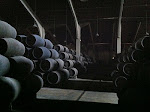NY Producers and Wine in Grocery Stores
In my last post about the Governor's proposal to allow grocery stores to sell wine, I didn't discuss New York wine producers. How will they fare if this legislation is enacted?
On the whole, NY wineries seem to support the proposal. There are about 21,500 grocery stores in New York State and about 2,500 liquor stores, according to the Rochester Democrat and Chronicle. That means an additional 19,000 potential customers. That's an exponential increase and could mean an explosion in revenues.
I don't know though...if I were a NY wine producer, of good wine anyway, I would not be so excited. I might even be a bit worried.
There is nothing in the legislation to ensure that grocery stores stock New York wine. In other words, the decision whether or not to purchase New York wine would be at the discretion of the grocery store, as it is at wine and liquor stores.
The model of sales at a grocery store is quite different from that at a wine and liquor store. Grocery stores do not use sales staff to advise customers. In a grocery store, the product must speak for itself and brand name and price (and location in the store, but that's another story) are of paramount importance. Customers faced with a wall of laundry detergent must make their own decisions about what to purchase. No one says to a clerk "I'm thinking about a detergent and I want it to be a good stain remover, but I don't have a lot to spend. What can you recommend to me?"
But that is precisely what happens in wine and liquor stores everywhere. Perhaps not so much for sales of Gallo, Yellow Tail, or other mass market wines with good brand recognition. But for wines that cost more than $15 or $20 a bottle, and for small production wines, many customers like to speak with sales staff before making buying decisions. This will not be possible in grocery stores unless the store hires an employee for this purpose. And by the way, the wine stores that can't do this kind of thing well are among the stores that are more likely to go out of business if the legislation is enacted.
Without such an employee (and even with one), New York wines are likely to get lost in the supermarket wall of wine. Why? Because New York wine does not yet have the brand recognition to sell itself. And because wines from California and the rest of the world have an established reputation for quality that New York wines do not yet have, but New York wine often costs the same amount or more than their counterparts from elsewhere.
The New York wine that sells for under $10 might compete with similarly priced wine at a grocery store. But I would guess that the higher end wine would not sell at a grocery store. Imagine a customer with no prior knowledge of New York wines - what must happen for that customer to decide to purchase an $18 or $26 bottle of Long Island Cabernet Franc? Sales staff would have to recommend the wine. Retail sales of high end New York wine might actually decline under the new legislation if the people who buy a $25 bottle of wine every now and then stop shopping and wine and liquor stores and start doing their wine shopping at grocery stores.
I received an email today from the marketers who represent the National Federation for Independent Business (NFIB). In their email they included a link to the wine list at a Wegmans (a large Rochester-based grocery chain) restaurant called Tastings. There are 110 wines on the list, four of them are New York wines. The NFIB claims that this is representative of what will happen at all of the large grocery stores under the new legislation.
But hey, that's just the way I see it, and what do I know. Wine producers seem thrilled about the proposal and wine and liquor stores are terrified. In fact, I heard from New York wine blogger Lenn Thompson that some retailers are exerting pressure of their own. Lenn told me that he has reliable sources who say that "In upstate New York, any wineries that show public support (for the proposal) are being unofficially boycotted by wine shop owners (meaning that wines are being pulled from shelves). It's getting ugly up there...but no one is talking on the record...which you'd expect."
Care to share your opinion? How do you think New York wine producers would fare if this proposal passes?







12 comments:
Re Wegman's (and continuing from my comment on the previous entry), I think you need to look at Nicole Wegman's store for an idea of what Wegman's might be doing. Her store is well stocked with NYS wines, both Finger Lakes and LI.
I think this would be a boon for the Finger Lakes. Their wines (even many of the better ones) do hit the right price points. And many of the wineries produce low cost hybrid or fruit wines that would be a natural for grocery stores. I don't know if you've ever been to the Finger Lakes (if not I highly recommend it, especially if you're a Riesling fan) but it is very different from LI.
Just taking a quick scan of some FL wines I bought last year when I was upstate I see many good Rieslings (including Salmon Run, Thirsty Owl, Hosmer) for under $11.00. The Hermann J. Wiemer Riesling is $14.99, worth every penny and then some, and will appeal to many. There are good Cabernet Francs (including Hosmer) for under $15. Good (and bad) sparkling wine can be had for cheap and cheaper (I'm partial to the Chateau Frank sparkling Riesling at $19.99).
Re the more mass market wines, besides the grocery stores let's not forget Costco. I guarantee that they will make a big move into wine. Their Westbury store already has a semi affiliated wine store next door, and Costcos in states like CA have big wine selections. Quality will be mixed at best, of course, but overall I think this will be very good for the industry in the long run, even if it's painful for some in the short run.
I find this debate somewhat amusing in that people who live in NY appear to think that this is some kind of apocalyptic event that will forever change the landscape of the city.
Most of the rest of the country has somehow survived grocery stores selling wine, and I suspect the same will be true with New York. The con arguments on this seem very weak and based upon the “little guys” getting destroyed. Undoubtedly some will disappear, but isn't that what capitalism is fundamentally based upon? I think protectionist measures like the one in effect in NY have no place in this day and age, and it’s time to eliminate them.
Unless they invest a lot of time and effort, grocery stores will stock mega production wines and almost entirely at sub $15 price points. Big players will probably even pay for shelf space. The market is already fragmented into the cost minded and the quality minded and even the convenience minded
along with other subsets.
I suspect the "pie" has been constrained all this time and this change allow the "pie" to expand.
I don't know if there are large producers in NY, if there are they will surely get themselves on shelves. The smaller ones will probably sell their wines just as they have.
I wonder if it wouldn't even help NY and all small producers who can get in the door, and potentially open up new avenues for authentically interesting value-oriented wines. I'm thinking here of Jancis Robinson's frequent recommendation of Tesco's (UK Wal-Mart) private-label wine in her FT column, and also if you read cellartracker you often see that someone bought something pretty good (e.g. chablis premier cru) on sale at costco -- which of course does not exist in Manhattan. It's hypothetically possible the proposed law could actually lower retail wine prices across the board in NYC, which if you check winesearcher are often around 10% higher than in other parts of the country for comparable wines. Seems to be some concern that quality of selection would converge toward the bottom, but I imagine the type of wine sold at a given store would be proportional to the quality of the produce, i.e. whole foods would probably have an intelligent selection (as they do with beer) while something like Key Food would aim more downmarket.
anon - there are no guarantees, nor should there be. your view is an optimistic one. who are you, and who do you work for, if you don't mind my asking.
david doyle - not sure where you get the "apocalyptic event" from. i agree with your conclusions, basically, as you read. i do think that this is a super important quaetion for the people who businesses stand to be impacted. these are scary times.
Ned - yup, agreed. paying for shelf space is common.
muskrat - interesting, but only time will tell.
BG -
I don't mind your asking at all. I'm an upstate boy, though I've lived in the NYC area since 1975. I'm a long time FL Riesling fan and a long time Wegman's fan (the best supermarket in the world) but only as a customer - never had any professional affiliation with either one. By day I'm an IT guy, and actually worked for a major wine/liquor importer in one of my many lives, but these days I'm working for a health care company.
FWIW, I'm also a big fan of your blog.
We are authors of a blog wine in Portugal, which has the address: http://do-nariz-a-boca.blogspot.com/
We visited your blog and enjoyed immensely, everything is very well organized, easy to understand, nice design, congratulations on your work.
We would like to make a request. You can create a link to your blog with our link?
If not ask for more, could even put a message on his blog, to make announcement on our blog.
We would appreciate very much.
We expect a response
pirusas.carvalho@hotmail.com
In the early to mid nineties I lived in both Houston and Dallas. Whole Foods sold wines, they even had a reasonable wine guy at the helm. However, he was the only one, and when he was gone... I bought all of the early Turley wines, Petite Sirah included, it was the 93 I believe. All for under 20$ a bottle. I couldn't live with the guilt of taking a Y'quem 375 for 11$, when the grocery sales guy said it was only a half bottle; you could barely see the $11(0) on the price tag. True I was having surgery the next day and it was a bit of a bad karma feeling. How many others.. well Spatlese and Auslese at the same price, even times with KAbinett and Auslese at the same price, Erdener Pralat, love those German labels...
I am against wine sales in grocery stores because it threatens my distribution chain. As a LI wine producer (Bouké) I depend on wine and liquor stores that carry and hand-sell local artisinal wines. If their economic viability is at stake, there will be less shelf space available for new and interesting wines and more shelf space for industrial, mass-produced wine.
thanks anon, much appreciated.
johnt - seems as though the discretion of the wine buyer (and sales staff) at the supermarkets will be an important variable, agreed. I hope your surgery went perfectly, after that pass on the Yquem.
hi lisa - thanks for your comments. but there will continue to be liquor stores, as there are in the bulk of the other 35 states that do this. and maybe those that remain will last precisely because they sell interesting small production wines such as yours (delicious white, by the way, haven't tried the red or the rose). after the dust settles from the initial explosion, i imagine that your supply chain might not be impacted in a major way. the one exception being if there is a wine store in the same mall as a supermarket - that kind of competition might be hard to overcome, unless the liquor store can also sell cheeses and charcuterie, etc.
I think that one item that is being left out of these comments is that NYC is not the only area being affected. All liquor and wine retailers in NYS will be affected.
There are strong arguments against this issue and the general public is not being well informed of what actually WILL happen. This is certainly not the solution to stimulating our economy. Putting more money into the hands of mega stores? People need to realize that the small wineries in New York State will not profit if Walmart gets wine. Think about that please.
smiller7152@charter.net
I would agree with earlier comments about the large chain stores not carrying local wines from NY. However, with the large trend towards buying local products, I feel the NY wineries will continue to do fine. Most people who are looking to buy local do not go to Walmart for their food, and I suspect they will also not go for their wines. Perhaps the NY wineries will need to be more aggressive with marketing their products. The same will be true of the liquor stores trying to compete. What it really comes down to is people putting their game face on and adapting to change.
Post a Comment